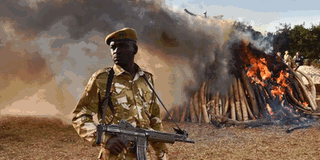Prices of illegal ivory in China drop, raising hopes in war on poaching

A Kenya Wildlife Service ranger stands near a burning pile of 15 tonnes of elephant ivory seized in Kenya at Nairobi National Park on March 3, 2015. PHOTO | CARL DE SOUZA |
What you need to know:
- Kenya-based conservation organisation Save the Elephants said Monday that the price of illegal raw ivory in China had fallen to $1,100 (1,000 euros) per kilogramme, down from a record high last year of $2,100 (1,900 euros) per kilo.
- Chinese celebrities have fronted advertising campaigns and in October Britain’s Prince William appealed to Chinese people to boycott ivory during a state visit to London by Chinese President Xi Jinping.
- It is estimated that more than 30,000 elephants are killed for their tusks every year.
- In October, an elderly Chinese woman dubbed the “Ivory Queen”, was arrested in Tanzania over links to $2.5 million (Sh5.4 billion) smuggled ivory, has been charged.
NAIROBI, Monday
Illegal ivory has halved in value in China according to new research, leading to hopes that the demand which drives poaching in Africa might be on the wane.
Kenya-based conservation organisation Save the Elephants said Monday that the price of illegal raw ivory in China had fallen to $1,100 (1,000 euros) per kilogramme, down from a record high last year of $2,100 (1,900 euros) per kilo.
“The news gives cautious hope that the unsustainable killing of Africa’s elephants - driven by demand for their tusks - may eventually be reduced,” Save the Elephants said in a statement.
The group added that at current prices the organised criminal gangs that run the illegal ivory trade will still make profits but that “the trend is a positive sign”.
CHINESE EFFORTS
China has this year taken steps to reduce both the legal and illegal ivory trades - although a total ban has not been put in place - and awareness of the impact of the trade on Africa’s elephants is growing among Chinese consumers.
Chinese celebrities have fronted advertising campaigns and in October Britain’s Prince William appealed to Chinese people to boycott ivory during a state visit to London by Chinese President Xi Jinping.
It is estimated that more than 30,000 elephants are killed for their tusks every year.
“The fall in the price of ivory gives us hope, but with numbers of elephants still being killed in Africa we’re a long way from celebrating yet,” said Save the Elephants founder Iain Douglas-Hamilton.
The international ivory trade was banned in 1989 but one-off sales of ivory stockpiles have since been permitted and trade in old ivory is also allowed, giving criminal smugglers cover for their illegal trade.
In October, an elderly Chinese woman dubbed the “Ivory Queen”, was arrested in Tanzania over links to $2.5 million (Sh5.4 billion) smuggled ivory, has been charged.
Ms Yang Fenglan, 66, has been accused of smuggling 706 elephant tusks from Tanzania between 2000 and May 2014.
According to The Citizen, Ms Yang was on the radar for over a year before an elite unit set up to fight poaching pounced on her last week in a car chase in Dar es Salaam.
She faces up to 30 years in prison if convicted. Ms Yang was charged at the Kisutu court alongside Tanzanians Salvius Matembo and Manase Philemon.





